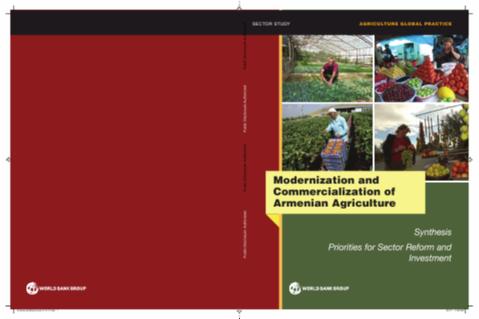The World Bank is a vital source of financial and technical assistance to developing countries around the world. We are not a bank in the ordinary sense but a unique partnership to reduce poverty and support development. The World Bank Group has two ambitious goals: End extreme poverty within a generation and boost shared prosperity.
- To end extreme poverty, the Bank's goal is to decrease the percentage of people living on less than $1.25 a day to no more than 3% by 2030.
- To promote shared prosperity, the goal is to promote income growth of the bottom 40% of the population in each country.
The World Bank Group comprises five institutions managed by their member countries.
The World Bank Group and Land: Working to protect the rights of existing land users and to help secure benefits for smallholder farmers
The World Bank (IBRD and IDA) interacts primarily with governments to increase agricultural productivity, strengthen land tenure policies and improve land governance. More than 90% of the World Bank’s agriculture portfolio focuses on the productivity and access to markets by small holder farmers. Ten percent of our projects focus on the governance of land tenure.
Similarly, investments by the International Finance Corporation (IFC), the World Bank Group’s private sector arm, including those in larger scale enterprises, overwhelmingly support smallholder farmers through improved access to finance, inputs and markets, and as direct suppliers. IFC invests in environmentally and socially sustainable private enterprises in all parts of the value chain (inputs such as irrigation and fertilizers, primary production, processing, transport and storage, traders, and risk management facilities including weather/crop insurance, warehouse financing, etc
For more information, visit the World Bank Group and land and food security (https://www.worldbank.org/en/topic/agriculture/brief/land-and-food-security1
Resources
Displaying 311 - 315 of 4907Growth Poles
This report looks at the growth poles
policy in Romania to determine ways to increase its
effectiveness and efficiency for the next programming cycle
(2014-2020). The growth poles policy in Romania has been
initiated in 2008, as a means to support a balanced economic
development of the country, while still targeting
investments to maximize economic impact. A total of seven
growth poles have been designated and are currently
Modernization and Commercialization of Armenian Agriculture
The study focuses on themes and areas that have been identified as highly relevant for the modernization and commercialization of the agriculture sector. The study originally aimed to review: agricultural marketing, processing and exports; food safety; agricultural “cooperation,” including farmers’ groups; agricultural extension and agricultural insurance.
Elaboration of Integration Strategies for Urban Marginalized Communities
The current report is part of the work
on integrating poor areas and marginalized communities in
Romania. Specifically, the Bank's technical assistance
provided through this project focuses on three primary
components: (1) a methodology for defining different types
of urban disadvantaged communities based on a set of key
criteria and indicators; (2) detailed maps that present the
spatial distribution of these indicators and the
Corporate Financial Reporting in Austria
The purpose of this report on corporate
financial reporting in Austria is to describe the key
features of Austria’s corporate financial reporting
environment as well as its practical application in regard
to small and medium enterprises (SMEs’) financial reporting
practices in Austria. This report builds on the World Bank
accounting and auditing reports on standards and codes
(ROSC) methodology to give an overview of the Austrian
Investment Climate in Kyrgyz Republic
The World Bank Group’s investment
climate project conducted a survey of foreign investors in
the Kyrgyz Republic - both those currently operating and
those that have terminated their operations for various
reasons. The purpose of the survey was to assess selected
aspects of the investment policy and legal environment in
place in the Kyrgyz Republic, so as to determine whether the
current regulations are investment-conducive or otherwise.







